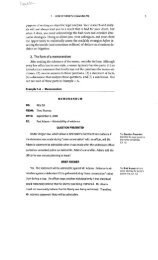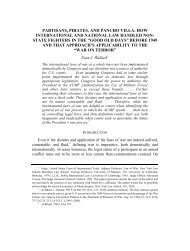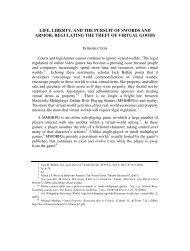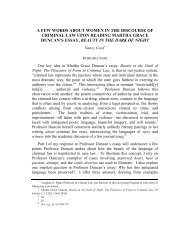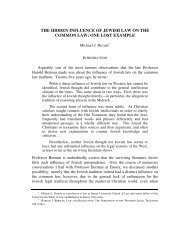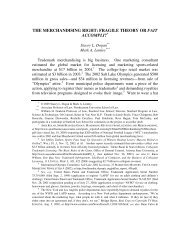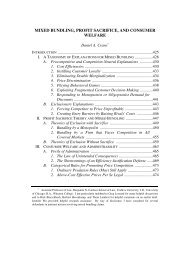Chimera and the Continuum of Humanity - Emory University School ...
Chimera and the Continuum of Humanity - Emory University School ...
Chimera and the Continuum of Humanity - Emory University School ...
Create successful ePaper yourself
Turn your PDF publications into a flip-book with our unique Google optimized e-Paper software.
370 EMORY LAW JOURNAL [Vol. 55<br />
cognition. Consequently, <strong>the</strong>se higher-level brain functions are crucial in<br />
defining constitutional personhood. 169 Some commentators argue that “[a]ll<br />
rights enumerated in <strong>the</strong> Constitution <strong>and</strong> <strong>the</strong> Bill <strong>of</strong> Rights are predicated on<br />
consciousness, or <strong>the</strong> capacity for consciousness, except for <strong>the</strong> right to life<br />
itself, which becomes meaningless when consciousness can never exist.” 170<br />
While analogies to <strong>the</strong> legal definition <strong>of</strong> death can help clarify what is<br />
necessary for chimera personhood, namely a continuing capacity for higherlevel<br />
cognitive function, it cannot fully resolve what is sufficient for<br />
personhood in a creature that is not entirely human.<br />
IV. THE MORALITY AND BIOETHICS OF CHIMERA<br />
Traditional legal sources alone are insufficient to resolve <strong>the</strong> thorny<br />
question <strong>of</strong> human-animal chimera personhood. 171 Therefore, <strong>the</strong><br />
constitutional proposal presented in Part V must also make use <strong>of</strong> <strong>the</strong> moral<br />
<strong>and</strong> bioethical sources presented in this Part. 172 This reliance on non-legal<br />
sources is not an analytical deficiency because defining “personhood” should<br />
be an exercise in morality <strong>and</strong> natural law, 173 as opposed to a sterile syllogistic<br />
analysis. 174 Moral <strong>and</strong> ethical considerations, a bedrock <strong>of</strong> natural law, play a<br />
vital role in analyzing this type <strong>of</strong> constitutional issue. 175<br />
169 See id. (“Personhood encompass an inner-directed <strong>and</strong> an outer-directed will. An individual who is<br />
permanently unconscious has no will. In <strong>the</strong> absence <strong>of</strong> will, thought, expression, or consciousness, legal<br />
rights <strong>and</strong> liberties have no reference <strong>and</strong> thus no meaning.”).<br />
170 Id.<br />
171 See supra Part III.<br />
172 See Attanasio, supra note 149, at 1328 (noting that moral <strong>the</strong>ory can help overcome inadequacies in<br />
constitutional <strong>the</strong>ory in <strong>the</strong> biotechnology field).<br />
173 Natural law is defined as: “[a] philosophical system <strong>of</strong> legal <strong>and</strong> moral principles purportedly deriving<br />
from a universalized conception <strong>of</strong> human nature or divine justice ra<strong>the</strong>r than from legislative or judicial<br />
action; moral law embodied in principles <strong>of</strong> right <strong>and</strong> wrong.” BLACK’S LAW DICTIONARY 1049 (7th ed.<br />
1999).<br />
174<br />
PAUL E. SIGMUND, NATURAL LAW IN POLITICAL THOUGHT 109 (1971) (discussing <strong>the</strong> use <strong>of</strong> natural<br />
law to interpret <strong>the</strong> Fifth <strong>and</strong> Fourteenth Amendments).<br />
175 As Justice Cardozo stated, a form <strong>of</strong> natural law provides “<strong>the</strong> main rule <strong>of</strong> judgment to <strong>the</strong> judge<br />
when precedent <strong>and</strong> custom fail.” Id. at 169 (citing BENJAMIN CARDOZO, THE NATURE OF THE JUDICIAL<br />
PROCESS 142 (1921)). Unfortunately, “[j]udges not only fail to invoke philosophical support for <strong>the</strong>ir ideas <strong>of</strong><br />
personality, but also inconsistently apply jurisprudential <strong>the</strong>ory in resolving problems <strong>of</strong> legal personhood,<br />
approaching it more as a legal conclusion than as an open question.” Note, supra note 132, at 1747.



